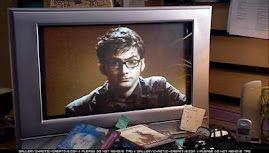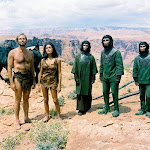Torchwood (BBC One) (Saturday July 11th 2009)
The thing that I’ve just realised about Torchwood — and God knows why it has taken me so long — is that it is essentially very, very silly.
Why did I never notice it was silly before? How could I not have noticed that? What did I think it was — normal? This is not normal. It’s the bloke from Tonight’s the Night saving the Earth from a souped-up basement in Cardiff. In a fractionally different universe — the type Torchwood deals with all the time — it could be Des O’Connor kicking alien butt from a “special” loft in Cornwall; or Il Divo thwacking Greys in Troon. Torchwood has a level of inbuilt ludicrousness so large that it may even be the bedrock of its existence.
But despite all the silliness, or maybe because of it— after all, it never did the equally ludicrous Spooks any harm — Torchwood has gone from strength to strength. For a show that started as a cultish Doctor Who spin-off, Torchwood now has an international audience — it, like David Hasselhoff, is huge in Germany, and it is BBC America’s biggest show — and has grown in prominence in the UK. From a late-night slot on BBC Three, the second series of Torchwood got bumped up to BBC Two, and last week Torchwood: Children of Earth was stripped across five nights on BBC One, essentially making July 6-11, 2009 the BBC’s “Torchwood Week”. Given its inexorable promotion through the BBC’s channels, you do wonder where the BBC will schedule the next series. At this breakneck rate, it will have to invent a special BBC Platinum First Class for it.
With five nights to play with, the scripts of Russell T. Davies and, on Wednesday, James Moran, took on an Aga slow-cook with the plot. It was your classic “aliens are coming to steal our children” scenario. Aliens make contact, demanding 10 per cent of the Earth’s children, or they will wipe out the human race. A high-ranking civil servant — Frobisher, played by the always hot Peter Capaldi — is put in charge of the crisis, which is in some way linked to a secret event in 1965. Back then, the aliens were referred to merely by a number, “The 456”. The 456 are, from their disturbing name up, clearly bad news. In all his increasing dealings with them, Capaldi does a good impression of a man gradually losing all the saliva in his body from pure terror.
Meanwhile, and obviously, Torchwood gets involved. Two major cast members died in the last series, but that’s OK, because Captain Jack is just about to pay an incredibly unexpected visit to his daughter and grandson! Yeah, that’s right. But Jack didn’t have much time to enjoy being the world’s first bisexual, immortal granddad. By the end of Torchwood Monday, a bomb sewn into his stomach had exploded, destroying the Torchwood Hub. Given that the big fact about Captain Jack Harkness is that he ends up, billions of years into the future, being the Face of Boe, the explosion raised the real possibility that this was the point at which he lost the “Rest of Boe”, and that the remainder of the series was going to revolve around John Barrowman’s head stuck in a jug.
But as Torchwood Tuesday confirmed, the power of light entertainment is so strong that in Barrowman it takes a lot more than 3kg of high explosive detonating in his intestinal tract to stop him. This is, after all, a man who can handle a Barry Manilow medley in a glitter suit, while dancing down some steps, and then do a live throw to a karaoke team of nurses from Arundel. Having been reduced to mince, although admittedly, not for the first time in his life, Barrowman managed to reassemble and then re-animate; just in time for a government hitwoman to entomb him, alive, in concrete. I know. In another world, it could have been Bruce Forsyth in there.
The next five minutes marked what will surely be the all-time highpoint of Torchwood silliness: the rest of the Torchwood team busting the concrete-covered Jack out of a secure military compound on a forklift truck. While I don’t have much hands-on experience with forklifts, I’m fairly sure their mph tops out at about 3mph, possibly 5mph, if you floor it. It seemed fairly obvious that if anywhere on the secure military compound the government assassins had been able to find even a golf cart, or a pogo stick, they could have successfully given pursuit of a forklift operated by a screaming, pregnant Welsh woman, bearing the fourth plinth from Trafalgar Square on its prongs.
But what was ultimately devastating about Torchwood Week was that, by Torchwood Wednesday, the encroaching darkness of the 456 started to crush brutally all the silly, Scooby Doo-ness out of the show. Indeed, by yesterday’s concluding episode, it was hard to imagine that Barrowman had ever starred in a two-month run of Aladdin at the Birmingham Hippodrome, in a pair of peach-coloured satin harem-pants.
The 456, you see, materialised in the M15 building, in a glass box full of poison, screaming and ejaculating against the misty windows. Even without the screaming, Murray Gold’s orchestral theme for the 456 — dissonant, corroding, two-note brass stab, as if this was all of Holst’s Mars that could be salvaged after a nuclear catastrophe — made every scene with the 456 feel hopeless: as if they’d already won. When we finally pierced the mist, and got to see what the 456 looked like, we found that each one had a human child, stolen in 1965, bound up and living in its ribcage, like a silk-bound fly in a web; eyes bulging and black.
The aliens didn’t need the children because they were dying; a scenario in which, in our sci-fi conversant age, one is apt to think, “Fair enough, aliens”. But the aliens wanted the children inside them “because they make us feel good. There are,” the 456 explained, delicately, “chemicals.” Human children were, in short, alien narcotics. And to prevent the world’s destruction, the Government was willing to turn dealer to the 456. In a plot-move that will surely see exam results rise perpendicularly among young Torchwood fans, the Government chose the sacrificial 10 per cent on the basis of schools Sats results — “the ones who are going to spend a lifetime on benefits anyway” — and sent in the Army to round them up.
Society began to collapse. Children were bussed to collection points as their mothers wept. Ianto, Captain Jack’s lover, died in the confusion. Capaldi, unable to save his own children, quietly went upstairs into his daughter’s pink bedroom and shot his entire family. Anyone who had been watching Torchwood Friday as the prelude to a “big night out” would have silently taken off their stilettos around 9.30pm and sat silently on the sofa with a large vodka, crying.
In the end, the only way to save all the Earth’s children was to “fry” Jack’s newly discovered grandson. The boy vibrated in the centre of a metal plate, blood pouring from his nose and ears, screaming, before he died. It was an ending so unhappy that Jack teleported off the Earth ten minutes later, in much the same way that Russell T. Davies has teleported off to Los Angeles: finished with Doctor Who, leaving Torchwood’s future up in the air, and exiting on such a cold moral appraisal of humanity’s attitude to its children that you wondered if Torchwood could ever be silly again. As the 456 pointed out, we let thousands of children suffer and die every day for no reason other than indolence. At least the 456 were getting a kick out of it.







No comments:
Post a Comment